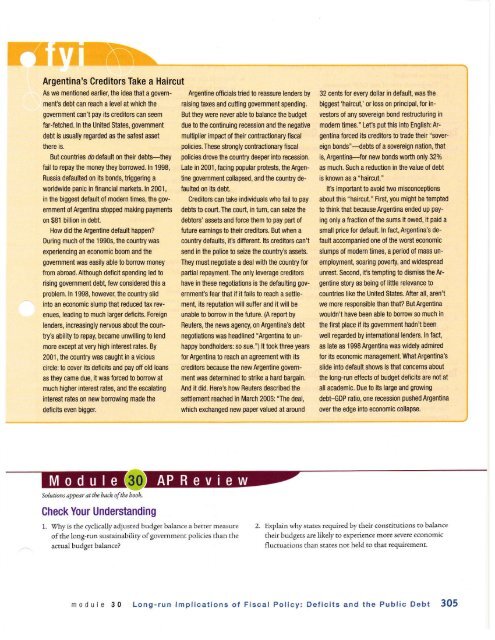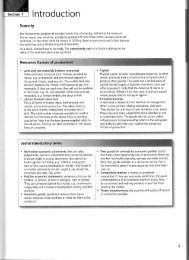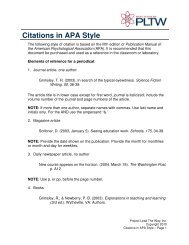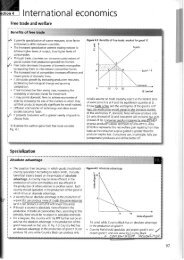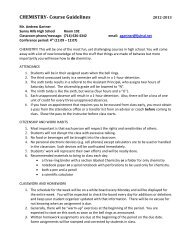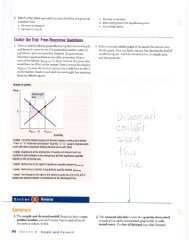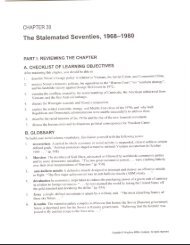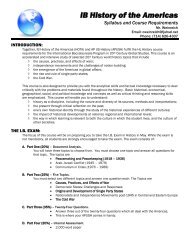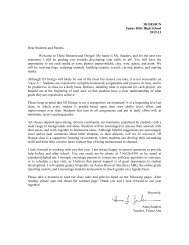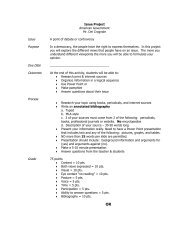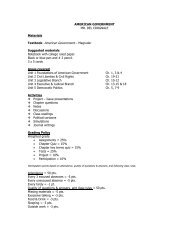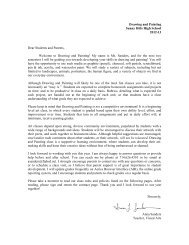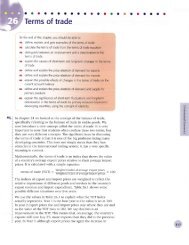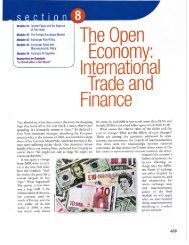AP Econ Module 30 Deficits Debt - Sunny Hills High School
AP Econ Module 30 Deficits Debt - Sunny Hills High School
AP Econ Module 30 Deficits Debt - Sunny Hills High School
You also want an ePaper? Increase the reach of your titles
YUMPU automatically turns print PDFs into web optimized ePapers that Google loves.
ffiffirywffimk<br />
Argentina's Creditors Take a Haircut<br />
As we mentioned earlier, the ldea ftat a govern- A4enline ofiicials tied to reassure lenders by<br />
ment's debt can reach a level at which the<br />
government can't pay ib creditors can seem<br />
tar-fetched. ln the United Shtes, government<br />
debt is usually regarded as the safest asset<br />
there is.<br />
But c0untries do default 0n their debts-they<br />
lail to repay the money they bon0wed. ln 1998,<br />
Bussia delaulted on its bonds, triggering a<br />
worldwide panic in financial markets.ln 2001,<br />
in the biggest default 0l modern times, be gov-<br />
emment olArgentina stopped making payments<br />
on $81 billion in debt.<br />
How did theArgentine delault happen?<br />
During much olthe 1990s, the country was<br />
experiencing an economic b00m and the<br />
govemm€ntwas easily able to bonow money<br />
from abroad.Although delicit spending led b<br />
rising government debt, few considered this a<br />
problem.ln 1998, however, the country slid<br />
into an economic slump that reduced tax rev-<br />
enues, leading to much larger deficits. Foreign<br />
lenders, increasingly nervous aboutthe coun-<br />
try's abilityto repay, became unwilling h lend<br />
more except at very high interest rates. By<br />
2001, fte counfy was caught in a vicious<br />
circle:to cover its deficib and pay otf old loans<br />
as they came due, it was forced to bonow at<br />
much higher interest rates, and the escalating<br />
interest rabs on new bofiowing made the<br />
deficits even bigger.<br />
Sol.tttiont dppear dt the bdck ofthe book-<br />
Check Your Understanding<br />
raising taxes and cutting govemment spending.<br />
But hey were never able to balance he budget<br />
due to the continuing recession and fie nega0ve<br />
multiplier impact 0f their contractionary fiscal<br />
policies. Th€se strongly contractionary fiscal<br />
policies drove the country deeper into recession.<br />
Late in 2001, facing popular protesh, the Argen-<br />
tine govemment collaps€d, and fie country de-<br />
faulted on its debt.<br />
Creditors can take individuals who lail to pay<br />
debts io court. Ihe court, in turn, can seize the<br />
debtors' assets and torce them to pay part of<br />
tuture earnings totheir ffedihrs. But when a<br />
c0untry defaults, it's different. lts creditors can't<br />
send in fie police to seize the country's assets.<br />
They must negotiate a deal with the counfry for<br />
partial repayment. The only leverage creditors<br />
have in these negotiations is the defaulting gov-<br />
emment's lear that il it talls to reach a settle-<br />
ment, its reputation will sufier and it will be<br />
unable h bonow in the future. (A report by<br />
1. 'ffhy is the cyclically adjusted budget balance a better measure<br />
ofthe long-run suscainabilicy ofgovernmenc policies than the<br />
accua.l budget bdance?<br />
Reuters, fie ne\,vs agency, on Argentina's debt<br />
negotiations was headlined "Argentina to un-<br />
happy bondholders:so sue.") lt took three years<br />
lor Argentina to reach an agreement with its<br />
creditors because the new Argentine govern-<br />
ment was determined to strike a hard bargain.<br />
And it did. Here's how Reuters described the<br />
settlement reached in March 2005:"The deal,<br />
which exchanged new paper valued at around<br />
32 cents for every dollar in default, was the<br />
biggest 'haircut,' or loss on principal,lor in-<br />
vestors of any sovereign bond restructudng in<br />
modern times.'Let's put this inb English:AF<br />
gentina forced its creditors to trade their "sover-<br />
eign bonds"-debts ot a sovereign nation, that<br />
is, Argentina-for new bonds worth only 32%<br />
as much. Such a reduction in the value 0l debt<br />
is known as a "hakcut."<br />
It's imporhnt to avold two misconceptions<br />
aboutthis "haircut." Flrst, you might be tempted<br />
h think that becaus€ kgentina ended up pay-<br />
ing only a fraction of he sums it owed, it paid a<br />
small price for default.ln lact, Argentina's de-<br />
fault accompanied one 0f the worst economic<br />
slumps 0f modern times, a period of mass un-<br />
employment, soaring poverty, and widespread<br />
unrest. Second, it's tempting to dismiss theAF<br />
gentine shry as being ot little relevance to<br />
countries like the United States. After all, aren't<br />
we more responsible han tha? ButArqentina<br />
wouldn't have been able t0 borrow so much in<br />
the lirst place if ib government hadn't been<br />
well regarded by international lenders. ln fact,<br />
as late as 1998 Argentina was lvidely admired<br />
for ih economic management. What Argentina's<br />
sllde into default sh0ws is that concerns about<br />
fie long-run effects 0I budget delicits are not at<br />
all academic. Due to its large and growing<br />
debt-GDP ratio, one recession pushed Argentina<br />
over the edge inh economic collapse.<br />
2. Explaio why states required by their consti[ucions to ba.lance<br />
rheir budgecs are likely ro experience more severe economic<br />
fluctuations than states not held to that requirement.<br />
module <strong>30</strong> Long-run lmplications of Fiscal Policy; <strong>Deficits</strong> and the Public <strong>Debt</strong> <strong>30</strong>5


